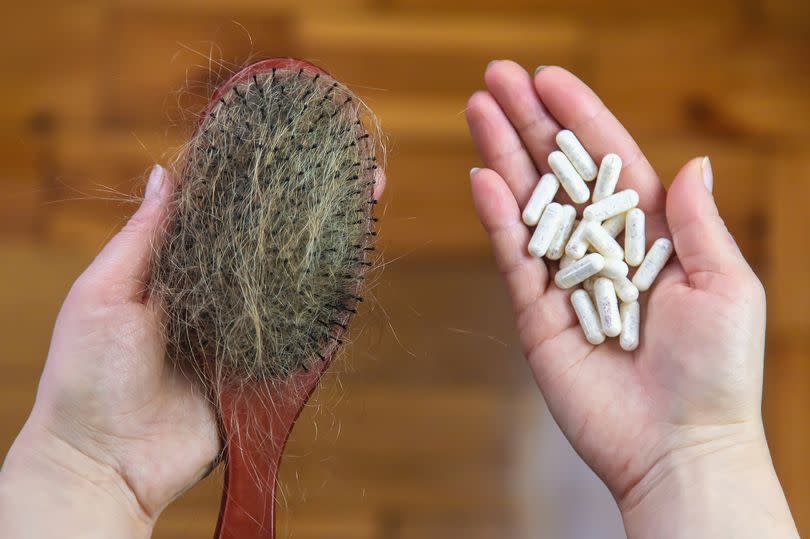Experts share six vitamins for thicker and longer hair and to tackle thinning

Vitamins and minerals are crucial for various bodily functions, including the growth of new cells - like your hair follicles. You may notice that your hair becomes dry, brittle and you could experience some hair loss, if you lack the essential vitamins needed for healthy hair growth.
Eating a nutritious diet and increasing your intake of a variety of essential vitamins and minerals is the best way to enhance hair growth. However, a significant lack of biotin, zinc, niacin, and iron can negatively affect hair growth and result in hair loss in rare cases.
Some studies have shown that these supplements can help improve the quality of your hair and help reduce shedding. Poor hair health and hair loss can be caused by various conditions and factors.
Usually, hair loss is caused by genetics, hormones, medical conditions and some medications. If you have any concerns, it is best to speak to a GP. But if you wish to increase your hair's length, shine and strength, these vitamins could help, as reported by experts at Holland and Barrett.
Biotin
Certain forms of vitamin B are believed to impact hair growth. This is because it can help carry oxygen to cells in the scalp and stimulate follicles.
Vitamin B7, also known as biotin, is particularly beneficial for hair health, though there is limited research for this. However, one study documented patients who took biotin supplementation showed evidence of clinical improvement after receiving it.
Biotin, a naturally occurring vitamin in the body, plays a crucial role in converting food into energy. This essential nutrient is believed to enhance hair health, as its deficiency can result in hair loss.
To ensure an adequate intake of biotin, you can incorporate more nuts, eggs, legumes, meat, and leafy green vegetables into your diet. However, an overabundance of biotin in the body can trigger severe side effects, such as skin rashes, digestive issues, and potential harm to the kidneys.
Protein
Hair is made completely of protein, so increasing your protein intake can promote hair growth. Studies show keratin - the protein component in hair - is critical for the production of normal healthy hai r and eating amino acids can help with the production of keratin.
Foods that contain essential amino acids include beef, poultry, fish, eggs, cottage cheese, broccoli, Greek yoghurt, soy, quinoa, oats and buckwheat.
Vitamin A
Vitamin A has the potential to work wonders for lacklustre hair. Not only does it have the ability to stimulate cell growth, but it also has the power to encourage your scalp pores to produce more oil.
This increased oil production can effectively moisturise your hair, giving it a beautiful shine. The secret lies in the production of sebum, an oily substance that plays a vital role in maintaining the health of your hair and scalp.
Food sources rich in vitamin A include eggs, cod liver oil, sweet potatoes, carrots and leafy green vegetables.
Zinc
Zinc serves various purposes in the body, such as aiding in cell tissue growth and regulating the oil glands in your scalp. By ensuring sufficient sebum production, it helps keep your hair moisturized and your scalp hydrated. Adding spinach, lentils, and pumpkin seeds to your meals is a great way to increase your zinc intake.
Vitamin E
Another nutrient recognised for supporting cell renewal is vitamin E. It assists in the restoration of cell tissue, particularly on the scalp. One study showed volunteers suffering from hair loss who took the supplement in a trial experienced increased hair numbers.
Vitamin E can also provide relief for scalp issues such as dandruff. You can increase your intake of vitamin E by incorporating more almonds, avocado, and sunflower seeds into your diet.
Iron
Iron plays a crucial role in various bodily functions, making it an essential mineral. One of its key functions is aiding red blood cells in transporting oxygen to the cells - including to the hair roots.
To ensure optimal iron absorption, try consuming more foods that are rich in this mineral. Insufficient iron intake can result in fatigue, tiredness, and in severe cases, anaemia.
There are many iron-rich foods to add to your diet, such as eggs, chickpeas, nuts, seeds, brown rice, baked beans, lentils, spinach, broccoli, tofu, and dried fruit.
Always speak to your doctor first before making any drastic diet or lifestyle changes and to check if there's another cause for your hair loss.

 Yahoo News
Yahoo News 
